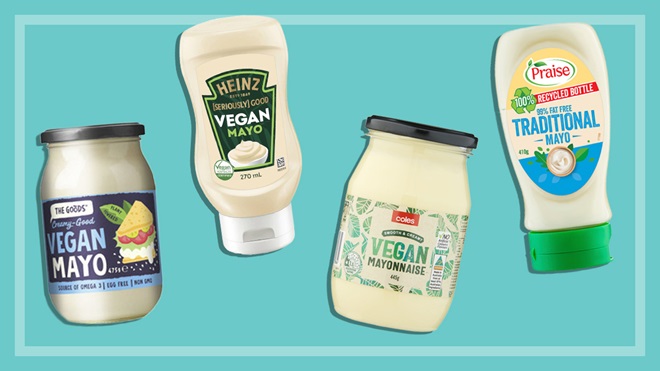When you make the decision to pivot to a thoroughly plant-based diet, there are a handful of foods that, for some, can sting a little to leave behind.
For some new vegans, a mourning period ensues for some of the big, everyday products that feature prominently in our diet, such as cheese, eggs and yoghurt.
But then there are the more subtle, non-vegan staples with their 'sleeper' animal-derived ingredients (ingredients that don't always seem to feature obviously in the finished foods), such as chocolate, pasta, some breads and mayonnaise.
The loss of mayo can hit hard for anyone who loves to dip their chip in the creamy condiment or who relishes a potato salad and classic coleslaw.
But it's never been easier to go eggless and have your mayonnaise, too. We've tested plant-based supermarket mayos to find the best fit for your salad sandwich.
What is plant-based mayonnaise?
Traditional mayonnaise is an emulsification of oil and egg. That fat-on-fat union is partly what gives the sauce its creamy texture.
But, surprisingly, long before 'plant-based' was something to tout on a label, some store-bought mayos were 'accidentally' vegan in an effort to cut costs. Mayo products such as Woolworths Essentials Mayonnaise and Praise 99% Fat Free Traditional Mayo are two such 'accidental' vegan products that are plant-based but aren't advertised as such.
These days, vegan mayo achieves its creamy mouthfeel with soy milk, aquafaba (the liquid byproduct of soaking legumes) or maize thickeners.
What was the best tasting vegan mayo?
Drumroll, please. The top-ranking plant-based mayonnaise was Heinz Vegan Mayo with a CHOICE Expert Rating of 67%, which is just 12 points off the entire product category winner (which includes egg-based mayos). This vegan condiment uses maize thickener for that classic mayo mouthfeel and has a pleasing, slightly sweet taste.
This squeezy bottle of deliciousness scored 73% for taste, which is 11 points higher than the next vegan mayo. At $5, it's on the higher end of the price scale, but for those vegans who miss spoonfuls of mayo to dial up their everyday meals, the flavour may easily justify the cost.
That said, at just 20%, Heinz Vegan Mayo's nutrition score was the lowest of all the plant-based products we tested. But, let's be honest, nobody who loves mayonnaise is choosing it for its health benefits.

Prince of plant-based mayo: Heinz Vegan Mayo with a CHOICE Expert Rating of 67%.
The top four performers
Here's the spread of the top four vegan mayo products.
1. Heinz Vegan Mayo
- CHOICE Expert Rating: 67%
- Taste score: 73%
- Price: $1.85 per 100g
- Country of origin: Made in Australia from at least 90% Australian ingredients.
2. Coles Vegan Mayonnaise
- CHOICE Expert Rating: 58%
- Taste score: 62%
- Price: 90c per 100g
- Country of origin: Made in Australia from at least 97% Australian ingredients.
3. Praise 99% Fat Free Traditional Mayo
- CHOICE Expert Rating: 58%
- Taste score: 61%
- Price: 90c per 100g
- Country of origin: Made in Australia from at least 85% Australian ingredients.
4. The Goods Vegan Mayo
- CHOICE Expert Rating: 57%
- Taste score: 61%
- Price: $1.11 per 100g
- Country of origin: Made in Belgium.
How does it compare with traditional mayo?
When thrown in the ring to compete with the classic egg mayonnaise products, Heinz Vegan Mayo held its own against most.
Coming in with CHOICE Expert Rating in the top 10, the lack of egg didn't hold the performance of this mayo back from being one of the tastiest.
With a taste score of 73%, there were just seven mayonnaise products out of the 34 that scored higher. It managed to pip big brands, such as Praise, S&W and cult brand Kewpie, at the post.
In the top 10, it was bested by two whole-egg Heinz products, one of which, Heinz Original Mayonnaise, took the top spot.
How we test plant-based mayonnaise
We test vegan mayonnaise alongside traditional recipes made with egg, so not only were they competing against each other in terms of flavour, but they were also competing against whole-egg versions.
Of the 34 supermarket-brand mayonnaise products we tested, six were vegan. Ten percent of the CHOICE Expert Rating was attributed to nutrition, but the remaining 90% was all about taste – and not simply flavour, but also texture and mouthfeel, as well as appearance and aroma.
We're on your side
For more than 60 years, we've been making a difference for Australian consumers. In that time, we've never taken ads or sponsorship.
Instead we're funded by members who value expert reviews and independent product testing.
With no self-interest behind our advice, you don't just buy smarter, you get the answers that you need.
You know without hesitation what's safe for you and your family. And our recent sunscreens test showed just how important it is to keep business claims in check.
So you'll never be alone when something goes wrong or a business treats you unfairly.
Learn more about CHOICE membership today
Stock images: Getty, unless otherwise stated.



